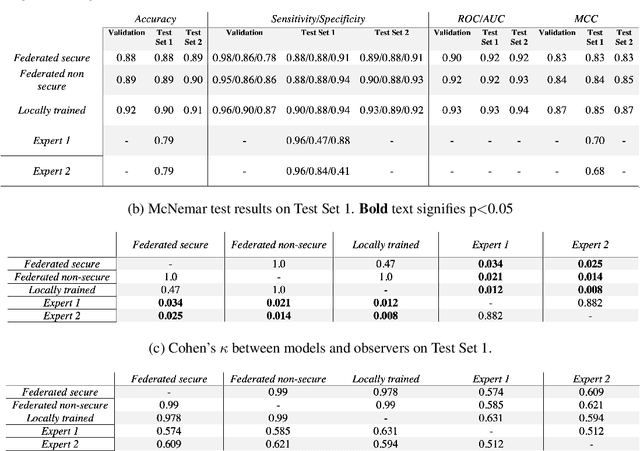Jason Mancuso
Privacy-preserving medical image analysis
Dec 10, 2020

Abstract:The utilisation of artificial intelligence in medicine and healthcare has led to successful clinical applications in several domains. The conflict between data usage and privacy protection requirements in such systems must be resolved for optimal results as well as ethical and legal compliance. This calls for innovative solutions such as privacy-preserving machine learning (PPML). We present PriMIA (Privacy-preserving Medical Image Analysis), a software framework designed for PPML in medical imaging. In a real-life case study we demonstrate significantly better classification performance of a securely aggregated federated learning model compared to human experts on unseen datasets. Furthermore, we show an inference-as-a-service scenario for end-to-end encrypted diagnosis, where neither the data nor the model are revealed. Lastly, we empirically evaluate the framework's security against a gradient-based model inversion attack and demonstrate that no usable information can be recovered from the model.
Detecting Spiky Corruption in Markov Decision Processes
Jun 30, 2019

Abstract:Current reinforcement learning methods fail if the reward function is imperfect, i.e. if the agent observes reward different from what it actually receives. We study this problem within the formalism of Corrupt Reward Markov Decision Processes (CRMDPs). We show that if the reward corruption in a CRMDP is sufficiently "spiky", the environment is solvable. We fully characterize the regret bound of a Spiky CRMDP, and introduce an algorithm that is able to detect its corrupt states. We show that this algorithm can be used to learn the optimal policy with any common reinforcement learning algorithm. Finally, we investigate our algorithm in a pair of simple gridworld environments, finding that our algorithm can detect the corrupt states and learn the optimal policy despite the corruption.
A generic framework for privacy preserving deep learning
Nov 13, 2018

Abstract:We detail a new framework for privacy preserving deep learning and discuss its assets. The framework puts a premium on ownership and secure processing of data and introduces a valuable representation based on chains of commands and tensors. This abstraction allows one to implement complex privacy preserving constructs such as Federated Learning, Secure Multiparty Computation, and Differential Privacy while still exposing a familiar deep learning API to the end-user. We report early results on the Boston Housing and Pima Indian Diabetes datasets. While the privacy features apart from Differential Privacy do not impact the prediction accuracy, the current implementation of the framework introduces a significant overhead in performance, which will be addressed at a later stage of the development. We believe this work is an important milestone introducing the first reliable, general framework for privacy preserving deep learning.
Private Machine Learning in TensorFlow using Secure Computation
Oct 23, 2018



Abstract:We present a framework for experimenting with secure multi-party computation directly in TensorFlow. By doing so we benefit from several properties valuable to both researchers and practitioners, including tight integration with ordinary machine learning processes, existing optimizations for distributed computation in TensorFlow, high-level abstractions for expressing complex algorithms and protocols, and an expanded set of familiar tooling. We give an open source implementation of a state-of-the-art protocol and report on concrete benchmarks using typical models from private machine learning.
 Add to Chrome
Add to Chrome Add to Firefox
Add to Firefox Add to Edge
Add to Edge